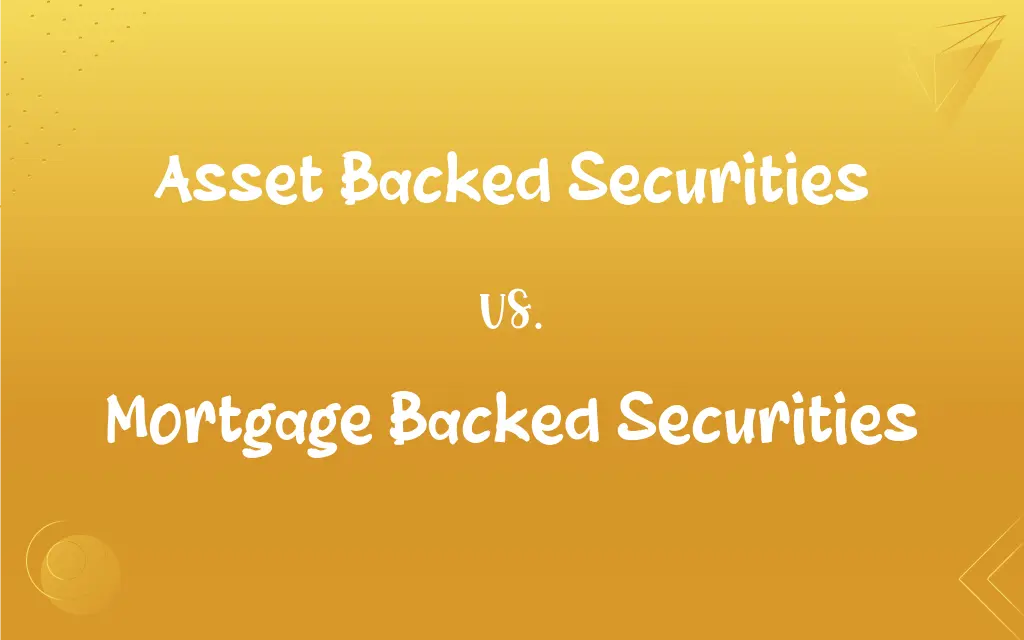Asset Backed Securities vs. Mortgage Backed Securities: What's the Difference?
Edited by Janet White || By Harlon Moss || Published on December 28, 2023
Asset-backed securities (ABS) are bonds backed by various types of financial assets, whereas mortgage-backed securities (MBS) are a type of ABS specifically backed by mortgages on real estate properties.

Key Differences
Asset-backed securities can be backed by various types of assets like auto loans, credit card debt, or student loans. Mortgage-backed securities are exclusively backed by home loans or mortgages.
The risk and return profile of ABS varies depending on the underlying assets, which can range from high-grade to subprime. MBS typically have a risk profile influenced by the housing market and the creditworthiness of mortgage holders.
ABS caters to a broad range of investors due to its diverse asset base, while MBS is often sought after by investors seeking real estate exposure without directly investing in property.
The cash flows of ABS depend on the payment patterns of the underlying assets. In MBS, cash flows are determined by mortgage payments, which include both interest and principal components.
Both ABS and MBS are subject to regulatory scrutiny, but MBS may face more specific regulations due to their direct link to the real estate market and their role in past financial crises.
ADVERTISEMENT
Comparison Chart
Underlying Assets
Diverse (loans, receivables, leases).
Specifically home loans or mortgages.
Risk and Return
Varies widely based on asset type.
Influenced by housing market, mortgage creditworthiness.
Investor Market
Broad range of investors.
Investors seeking real estate market exposure.
Cash Flow
Depends on underlying asset payments.
Determined by mortgage payments.
Regulatory Environment
Subject to general financial regulations.
More specific regulations due to housing market link.
ADVERTISEMENT
Asset Backed Securities and Mortgage Backed Securities Definitions
Asset Backed Securities
A form of securitization for different types of loans.
Credit card debt is often securitized into asset-backed securities.
Mortgage Backed Securities
Bonds collateralized by home loans.
The value of mortgage-backed securities is influenced by the housing market's performance.
Asset Backed Securities
Securities backed by a pool of assets.
The bank issued asset-backed securities to diversify its investment portfolio.
Mortgage Backed Securities
Investments secured by residential or commercial mortgages.
Investing in commercial mortgage-backed securities diversifies my real estate portfolio.
Asset Backed Securities
Financial instruments with returns dependent on asset performance.
Investors in asset-backed securities closely monitor the performance of the underlying assets.
Mortgage Backed Securities
A form of securitization for mortgage debt.
Banks often securitize mortgages into mortgage-backed securities to redistribute risk.
Asset Backed Securities
Bonds collateralized by various financial assets.
Asset-backed securities can provide stable returns in a diverse portfolio.
Mortgage Backed Securities
Securities backed by mortgage loans.
Mortgage-backed securities are a popular choice for investors interested in real estate markets.
Asset Backed Securities
Investments secured by receivables.
Auto loan receivables are commonly used to back certain asset-backed securities.
Mortgage Backed Securities
Financial instruments with returns dependent on mortgage payments.
The returns on mortgage-backed securities depend on homeowners making their mortgage payments on time.
FAQs
What are Asset-Backed Securities (ABS)?
ABS are financial securities backed by a pool of assets such as loans, leases, credit card debt, or receivables.
What are Mortgage-Backed Securities (MBS)?
MBS are securities secured by mortgage loans, allowing lenders to sell the mortgages to investors.
How do ABS and MBS differ?
ABS are backed by various types of assets, whereas MBS are specifically backed by mortgage loans.
Who issues MBS?
MBS are issued by government-sponsored enterprises like Fannie Mae and Freddie Mac, as well as private financial institutions.
What is the purpose of MBS?
MBS allow lenders to sell mortgages, providing liquidity and the ability to issue more loans.
Who issues ABS?
Financial institutions, banks, and lenders typically issue ABS.
What types of assets back ABS?
ABS can be backed by auto loans, student loans, credit card debt, and more.
Are MBS considered a type of ABS?
Yes, MBS are a specific type of ABS backed by mortgage loans.
How are MBS priced?
MBS pricing depends on the credit quality of the mortgage loans, interest rate environment, and prepayment risk.
What are the risks associated with ABS?
Risks include credit risk, interest rate risk, and the risk of the underlying asset performance.
Can ABS and MBS be traded?
Yes, both ABS and MBS can be traded in the secondary market.
How do ABS and MBS impact the financial market?
They provide liquidity, facilitate credit distribution, and contribute to financial market diversity.
How are ABS priced?
ABS pricing is influenced by the credit quality of the underlying assets, interest rates, and market demand.
What are the risks associated with MBS?
MBS risks involve homeowners' creditworthiness, interest rate changes, and prepayment risk.
How does prepayment risk affect MBS?
Prepayment risk in MBS arises when borrowers pay off mortgages early, impacting the investors' returns.
What role do credit ratings play in ABS and MBS?
Credit ratings indicate the risk level of ABS and MBS, influencing investor decisions.
What was the role of MBS in the 2008 financial crisis?
MBS, particularly those with subprime mortgages, were a major factor in the 2008 financial crisis due to defaults and falling housing prices.
What is the purpose of ABS?
ABS provide a way for lenders to free up capital and manage risk by selling assets to investors.
What is securitization in relation to ABS and MBS?
Securitization is the process of pooling various types of assets, including mortgages, to create securities like ABS and MBS.
How do investors benefit from ABS and MBS?
Investors receive regular interest payments, and these securities diversify investment portfolios.
About Author
Written by
Harlon MossHarlon is a seasoned quality moderator and accomplished content writer for Difference Wiki. An alumnus of the prestigious University of California, he earned his degree in Computer Science. Leveraging his academic background, Harlon brings a meticulous and informed perspective to his work, ensuring content accuracy and excellence.
Edited by
Janet WhiteJanet White has been an esteemed writer and blogger for Difference Wiki. Holding a Master's degree in Science and Medical Journalism from the prestigious Boston University, she has consistently demonstrated her expertise and passion for her field. When she's not immersed in her work, Janet relishes her time exercising, delving into a good book, and cherishing moments with friends and family.
































































